Feminism from the Future
Intelligent, tenacious, sexually liberated female protagonists? If only it weren’t science fiction.
By Michelle Criqui, James Madison University
It’s over one hundred years in the future, after nuclear bombs have gone off all across the world, and a dropship is hurtling toward the Earth.
On board are one hundred juvenile delinquents, sent from a space station called the Ark to test if the Earth is survivable. But it might also be because the Ark needs to conserve air that is rapidly running out.
The CW’s sci-fi drama “The 100” is messy, complicated and filled with fascinating morally gray situations. It also creates a world in which women can lead, kill, engineer and be motherly without being shoved into a box and given a specific role.
Not only that, but the show features a refreshing abundance of POC characters (just check out their recent DragonCon panel!) and LGBTQ+ representation that isn’t stereotypical or in-your-face.
In this world, people are just people, and you are actually judged based on what you say and do before anything else.
Because frankly, these characters have much bigger fish to fry. Let’s take a look at some of the badass heroines of the show, starting off with its multi-faceted protagonist, who is so much more than meets the eye.
Clarke Griffin
How many shows can you think of that feature a blond-haired, blue-eyed leading woman who isn’t a complete ditz? Eighteen-year old Clarke (played by the amazing Aussie actress Eliza Taylor) breaks down barriers as the show’s protagonist and boss, bravely standing up to men twice her size and fighting tooth and nail for what she believes in.
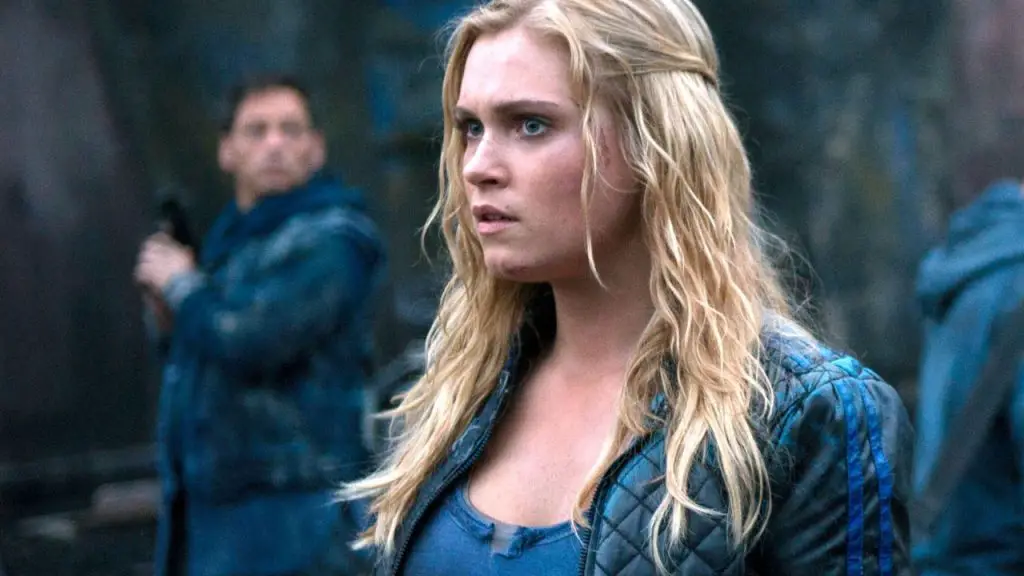
From the moment the delinquents land on the ground, Clarke takes charge, insisting that they go find supplies and work together in order to survive. She faces some heavy opposition at first, is frequently discredited and called “Princess” over and over until she is finally able to prove that she is so much more than that. She is courageous, artistic, fierce and incredibly smart for her age when it comes to political decisions, quickly gaining the utmost respect from her fellow delinquents.
Over the course of three seasons, Clarke assumes more and more responsibility, constantly putting her life on the line for her people and taking on leadership as if it were truly in her blood (and it kind of is, considering her mother Abby — played by Paige Turco — was an Ark councilmember). Clarke takes command not only of her peers on the ground, but (spoiler alert!) basically becomes an unofficial leader of the adults once they reach the Earth as well.
Clarke is also bisexual, and has a significant relationship with one of our other heroines in season three. But the amazing part about it is that it’s not a big deal. Clarke is allowed to lead and kick ass as the “Commander of Death”— or Wanheda, as the Grounders call he —and love whoever she decides to love without judgment. Honestly, reality could take a few pointers from the world of “The 100.”
Raven Reyes
Where do I even begin without getting emotional? Raven (played by Mexican-American actress Lindsey Morgan) is a ridiculously intelligent teenage mechanic with a heart condition and a paralyzed leg, who pushes through the worst of situations and just continually flashes a metaphorical middle finger at the world.
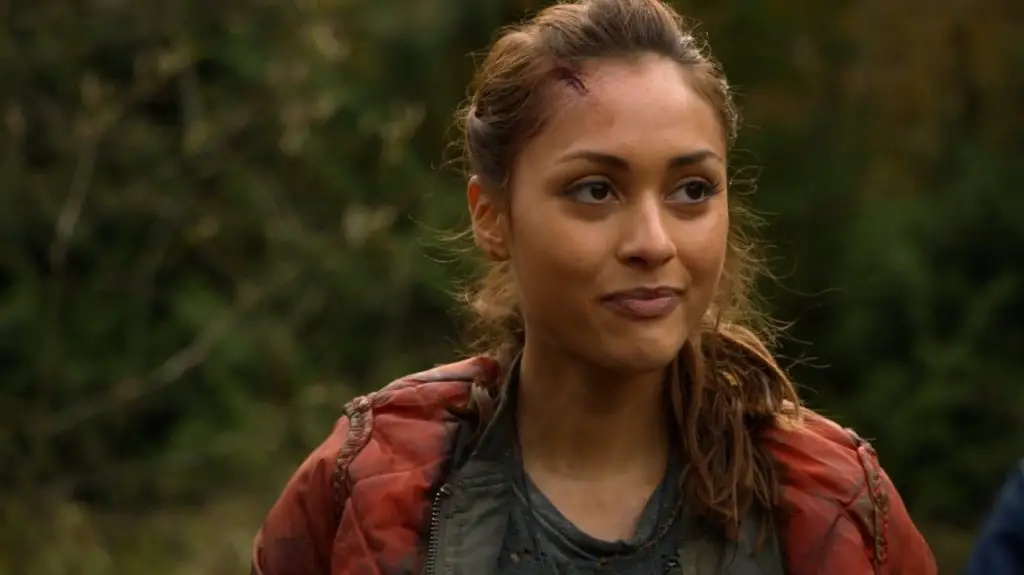
Although she is commonly seen crying in pain from physical torture or loss (which has sparked a lot of disdain from viewers, who continually beg the showrunners to just let her be happy for once), Raven is a fighter. She moves forward with whatever she has left, limping painfully, but with a ferocity in her eyes that’s incredible to watch.
She’s also known within the fandom as the woman to single-handed save everyone’s asses time and time again, with her vast wealth of technological and scientific knowledge. This was especially true in the third season, which involved an AI computer program that was set to wipe out the Earth’s population yet again. Without Raven working as the Sky People’s resident genius, it’s probably a safe bet to say that no one would have made it out alive.
Octavia Blake
Because air and resources were so scarce on the Ark, citizens were forced to adhere to a very strict policy of one child per family. Octavia, however, was a second-born. Her older brother, Bellamy (Bob Morley), helped their mother deliver her in secret and kept her hidden for the first sixteen years of her life, under the floorboards in their tiny space apartment.
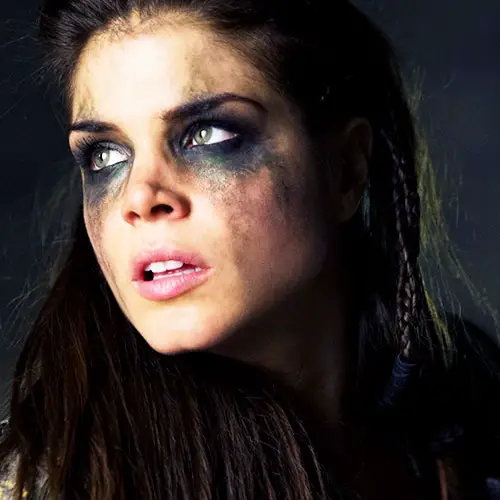
Unfortunately, however, she was eventually discovered and thrown into a cell, punished for simply being born. Her mother was “floated” (or pushed out into space to die), and Bellamy was…well, forced to be a janitor (yeah, still not sure why he got favored there).
Octavia (portrayed by Greek-Canadian actress Marie Avgeropoulos) was then sent down with the ninety-nine other “delinquents” to the ground, which honestly was the best thing to ever happen to her. Suddenly she was free, and allowed to be the fiercely independent woman she’d become.
In the first couple of episodes, Octavia kind of comes across as just an obnoxious, rebellious teenager. But as the show progresses, adding on layer after complex layer, Octavia transforms into this complete warrior, who isn’t afraid to get muddy and bloody during brawls with men four times her size. She’s the first to gain the trust of a Grounder, with whom she fights in battles and falls in love. She also manages to earn the respect of fierce Grounder chief Indra (played by the scene-stealing Adina Porter), eventually becoming her right-hand woman.
Octavia, with her wild Grounder braids and intensity in her eyes, proves that no matter where you begin your story, it’s up to you to decide where you go next. She’s likely to continue smashing skulls and stereotypes about her gender in season four as well.
Lexa, Commander of the 12 Clans
Now, this one is a spoiler for those of you who haven’t gotten through the second season yet, but I couldn’t make a list of badass female characters without including Lexa.
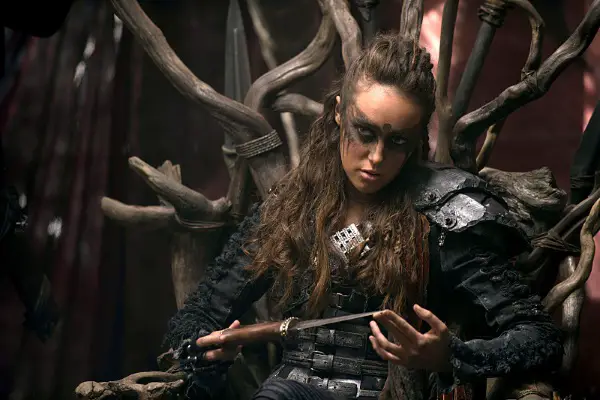
Lexa (played by Alycia Debnam-Carey) serves as Heda, or Commander, of the twelve Grounder clans, despite only being around twenty-years old (imagine having that on your resume!). Although she seems distant and emotionless when we first meet her, it’s revealed that she acts that way in order to keep the depths of her deep, resounding love for her people at bay so that she can make effective political and wartime decisions.
This has included sentencing even her closest of advisers to death for his betrayal, and staring her enemies boldly in the face when standing up for her people. Lexa is fearless, and a terrifying combatant (just check out this video of her owning in a fight with a man). But she can also be gentle and compassionate, and is an incredibly wise, level-headed leader for her age.
Oh, and did I mention that she’s also a lesbian? But again, when it comes to her character and ability to command, it makes no difference at all. What does matter is her strength and spirit, and the awe-inspiring way she’s able to make an entire room bow before her and bend to her will.
As the heroines of the “The 100” constantly prove, female characters—and women in general—can be just about anything. They can be fierce and intimidating, while also being thoughtful and kind. They can soft and tough, smart and courageous, outspoken and reserved. The key word there is “and.”
These four ladies, along with many other powerful female characters within the world of this show, demonstrate ground-breaking feminism without even trying. Because in this world, women are able to be whatever they set their mind to — without of any limitations determined by their gender, race or sexual orientation.
In fact, most of the time, it’s the women who are in charge or saving the day, without any attention being even drawn to the fact that they happen to be female while doing it. And that is one of the most poignant aspects of “The 100.”


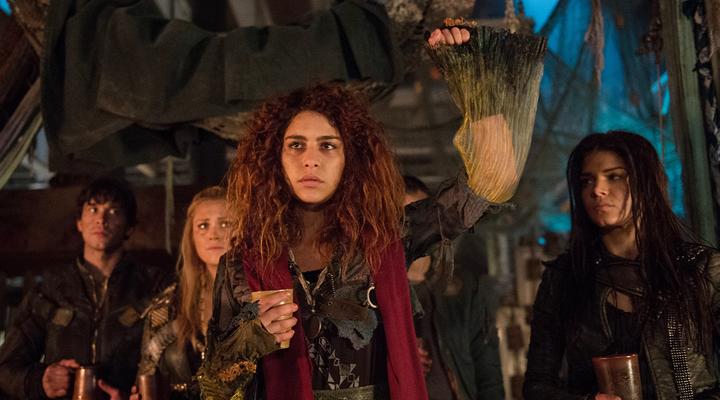

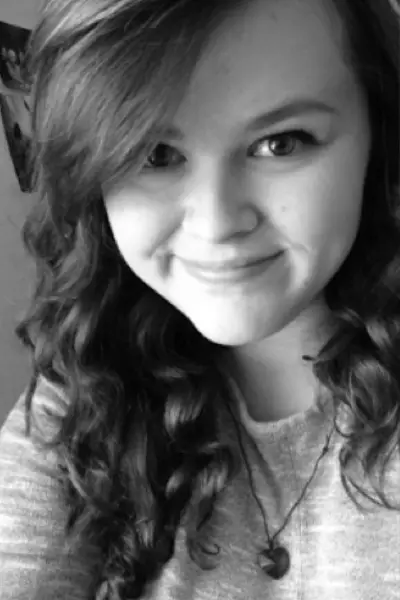













[…] The Groundbreaking Feminism in The CW’s ‘The 100’ […]